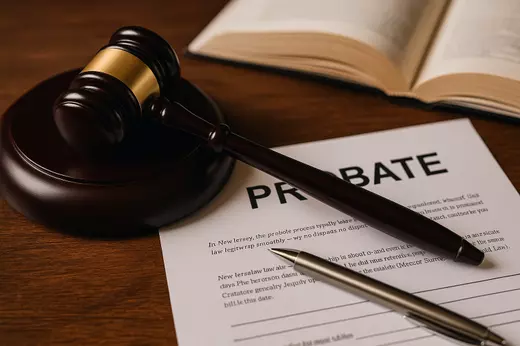New Jersey Probate Real Estate: A Guide to Selling Property in Probate
Selling or buying a home that's in probate can seem daunting, especially when you're already coping with the loss of a loved one. This guide breaks down everything you need to know about probate in New Jersey and how it relates to real estate. We'll an
Probate in New Jersey: Why It Matters for Real Estate
Probate is the court-supervised process for settling a deceased person’s estate. In New Jersey, it transfers ownership of assets (like a house) to heirs or beneficiaries by validating the will, appointing an executor or administrator, paying debts and taxes, and distributing what remains.
In New Jersey, probate is handled by the Surrogate’s Court in the county where the deceased lived. Not every asset must go through probate; jointly owned property or accounts with beneficiaries transfer directly without court involvement. But a house solely in the decedent’s name typically does require probate so someone has legal authority to sell or transfer it.
For real estate, probate matters because you generally can’t sell or refinance a deceased person’s home until the court appoints an executor or administrator and issues “Letters Testamentary” or “Letters of Administration.” This ensures the sale is legal and that proceeds go to the estate, then to heirs according to the will or state law.
How Long Does Probate Take in NJ?
9-12 Months
Typical timeframe for uncomplicated estates in New Jersey
18+ Months
Typical timeframe for uncomplicated estates in New Jersey
10 Days
Minimum waiting period after death to file the will
9 Months
Creditor claim period from date of death
Can You Sell a House Before Probate Is Complete in NJ?
Yes, you can sell a house during probate in New Jersey, but the executor or administrator must first be legally appointed by the Surrogate's Court and given authority through Letters Testamentary or Administration (NJ Probate Team).
If the will includes a clause allowing the executor to sell real estate, the process is simpler. Otherwise, the executor must petition the court for permission (Sandz Law). Sale proceeds usually go into a restricted estate account until the probate process is finalized (NJ Probate Team).
Buyers should be aware that these sales may take longer due to creditor claim periods and additional paperwork, but as long as the executor has proper authority, the transaction proceeds much like a normal real estate closing.
Who Handles the Sale During Probate in New Jersey?
Executor (with will)
Handles the sale once formally appointed by the court with Letters Testamentary
Administrator (no will)
Manages the sale with Letters of Administration from the court
The executor (if there is a will) or administrator (if there is not) handles the sale of probate property once formally appointed by the court with Letters Testamentary or Letters of Administration, as outlined by NJ Probate Team. Executors typically hire a licensed real estate agent experienced in probate sales to list the property, market it to qualified buyers, and coordinate with the estate attorney to ensure compliance with court requirements.
Transparency with heirs is encouraged, even if not legally required, since disputes can arise if they feel the property is being sold below value. Appraisals and CMAs are often used to justify fair market pricing (NJ Probate Team).
Steps to Selling a Probate Home in New Jersey
Open the Probate Estate and Appoint an Executor/Administrator
Open the Probate Estate and Appoint an Executor or Administrator
File the will with the county Surrogate’s Court, wait the 10-day minimum period after death, and then secure Letters Testamentary or Letters of Administration as explained by Rosenblum Law. For an overview of the full process and waiting periods, see Nolo’s New Jersey Probate Guide.
Secure and Insure the Property
Update insurance, secure the home, and maintain utilities (NJ Probate Team).
Prep the House for Sale
Make cost-effective repairs, deep clean the property, and disclose any known issues to protect the estate from future liability. Executors should focus on updates that increase buyer appeal without overspending, like paint, landscaping, and safety fixes. For more detailed guidance, see the NJ Probate Team’s recommendations for preparing a probate home for sale.
Market the Property
List the property on the open market, noting that it’s an estate sale if applicable. This helps attract serious buyers familiar with probate timelines. A professional real estate agent experienced in estate transactions can market the property strategically to maximize value while complying with court requirements.
Obtain Court Permission or Confirm Authority
Before listing or accepting offers, check whether they will explicitly authorize the sale of real estate. If not, the executor must petition the court for permission to sell the property, as explained by Sandz Law. Having this authority in place helps avoid legal delays later in the transaction.
Determine Value and Price Correctly
Executors have a fiduciary duty to maximize value for heirs. This typically involves ordering a professional appraisal or obtaining a Comparative Market Analysis (CMA) from a real estate agent. Both tools help establish fair market value and justify pricing decisions. For more insight, see Sandz Law’s overview of executor responsibilities in New Jersey probate sales.
Complete the Sale
Work closely with the title company and the estate attorney to ensure all legal and financial steps are handled properly at closing. The executor must verify that the title transfers correctly under court authority. For a detailed overview of this process, see the NJ Probate Team’s guide to selling a house during probate in New Jersey.
Wrap Up the Estate
After the sale, use the proceeds to pay any remaining estate debts and taxes, then distribute the balance to heirs once the court approves. Executors should maintain accurate records of all transactions to file a final accounting with the Surrogate’s Court before closing the estate.


